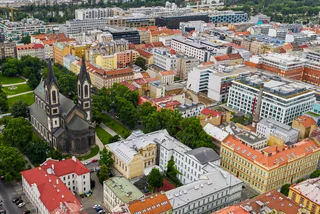The Czech Republic is becoming the bad boy of Europe on climate change. Damning data from the European Environment Agency has shown that while other EU countries are cutting their greenhouse gas emissions, the Czech Republic is the bloc’s only member where emissions are actually increasing.
The latest results show that Czech Republic emits the third largest volume of greenhouse gases per capita in the EU, behind only Luxembourg and Ireland, the EU’s fastest growing economies.
In no other country has the balance of emissions become worse since 2014. Analysts blame a lack of state investment into environmentally friendly developments during economic growth prior to the pandemic for the Czech Republic’s worsening environmental status. And with the EU making its climate goals even more ambitious during Covid, the Czech Republic has its work cut out to keep up with the rest of the bloc.
One element of the EU’s climate strategy put forward in a recent proposal is a ban on the sale of all fossil-fuel-powered vehicles, forcing a quicker transition to the use of electric cars. Czech Prime Minister Andrej Babiš has sternly opposed such plans, arguing that phasing out combustion-engine cars so rapidly would cause severe damage to the Czech economy, in which automotive manufacturing plays a major part.
“We will not agree with the ban on selling fossil-fuel cars,” said Babiš. “It is not possible. We can’t dictate here what green fanatics devised in the European Parliament.”
The Czech Republic is slowly making efforts to transition to greener energy solutions. The ČEZ Group recently shut down a unit at the Mělník coal-fired power plant as part of its efforts to shift its heat production and distribution business from coal-fired to low-carbon technologies. In May 2021, the company presented its “Clean Energy of Tomorrow” strategy aiming to align operations with the EU’s climate reduction policies.
Still, phasing out coal will present major difficulties due to the Czech Republic’s continued dependence on it as an energy source. And the current government’s distrust of “green fanatics” in Brussels does not bode well for the future development of climate-friendly policies. While most political parties have made promises on combatting climate change in their manifestos for the Czech election in October, environmentalists criticize a lack of specific planning to turn promises into reality.
“They still tend to avoid things they believe to be controversial. For example, they are all just waiting for the use of coal to end on its own, and they are afraid to make big political commitments,” said Daniel Vondrouš, from the Green Circle group of NGOs, in a recent interview with ČTK.
The Czech Republic’s slow progress on cutting emissions is causing frustration. But with the country still dependent on fossil fuel energy sources and associated industries, the green technology revolution will be a tricky path for politicians to navigate.












 Reading time: 2 minutes
Reading time: 2 minutes 

























